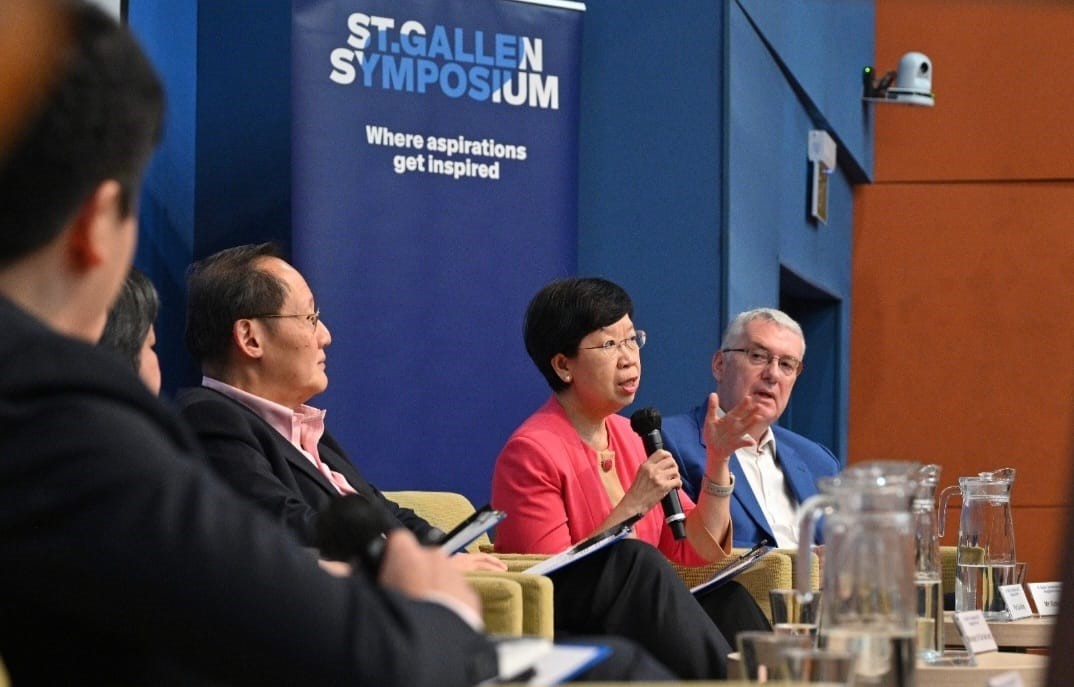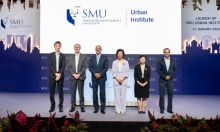Confronting scarcity worldwide and in Singapore at the 8th St. Gallen Symposium

When confronting scarcity, it is important that we look beyond the scarcity of resources and tackle the scarcity of ethics. This was the view that Professor Lily Kong, President of SMU shared during the 8th St. Gallen Symposium Singapore Forum on 25 January 2024.
The St. Gallen symposium is a student-driven organisation that aims to connect leaders of today and tomorrow, from business, politics, science, and civil society, to foster mutual understanding and joint action on some of the world’s most pressing challenges.
Titled “Confronting Scarcities”, the panel discussion delved into diverse topics ranging from the scarcity of ethics, resources, risk management and time.
The panel was moderated by Mr Tommy Koh Kit Shaun, Strategy Group & Policy Analytics, Prime Minister's Office. On the panel with Prof Kong were CEO of HSBC Mr Wong Kee Joo; CEO of Singapore Press Holdings Ms Teo Lay Lim; and Chief Executive of the Singapore International Chamber of Commerce (SICC) Mr Victor Mills. The keynote speaker for the event was Dr Tan See Leng, Minister for Manpower and Second Minister for Trade & Industry.
Prof Kong’s stance was a response to a question posed to the panel about what form of scarcity they thought would be Singapore’s downfall.
She noted that many of the challenges we face today, ranging from deepfakes, greenwashing and overconsumption stem from a scarcity of ethics.
The lack of ethics is leading to a huge push for consumption – to companies that push for consumption at the risk of destroying the environment, she suggested, bringing up fast fashion as an example. She added that fast fashion retailers often display a complete disregard for environmental impact, focusing instead on pushing for consumption with low prices, ever-changing clothing, and aggressive marketing of their products.
In sharing her views, Prof Kong also advocated for the embracing of our humanity in this age of generative AI and being more attuned to our ethical compass. She requested that we evaluate whether it is essential to consume every item we currently consume.

Considering the means and meaning of success
During Dr Tan’s keynote speech, he noted that scarcity is something that confronts all of us, regardless of country and generation.
“It is the central problem of economics – how to bridge the gap of ever-increasing demands, wants and in the midst of a limited supply of resources,” he stated, sharing the two approaches to resolving this.
“You can take from those with a larger pie and redistribute to those with smaller pies, or we can all work collectively to grow the pie, so that everyone can have a larger slice.”
In Singapore’s case, Dr Tan shared that the focus has always been on growing the pie. However, this has become increasingly challenging with factors such as intensifying global competition for capital and talent, fiscal constraints, and geopolitical tensions, among other factors.
In face of these challenges, Dr Tan expressed that there is a need for Singapore to grow through innovation, cooperation, and integration into the global economy.
This opinion was shared by Prof Kong, who expressed that Dr Tan’s comments resonated strongly with SMU, as its core curriculum has a strong multi-disciplinary focus with emphasis on ethics and social responsibility.
This opinion was further expounded during the question-and-answer session, where Prof Kong shared her strong belief that young people should be encouraged to carefully consider or redefine the meaning of success.
She said that instead of measuring success only by individual career advancement, we should foster mindsets that embrace collective responsibility and characters that prioritise making meaningful impact within our communities.



